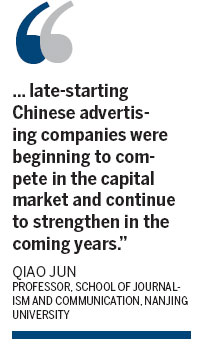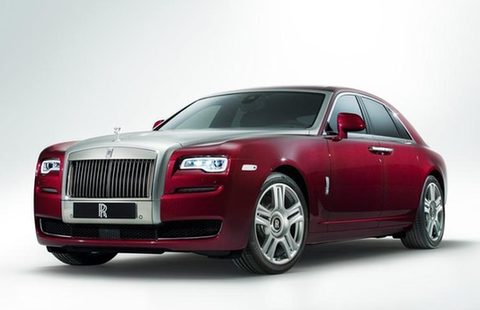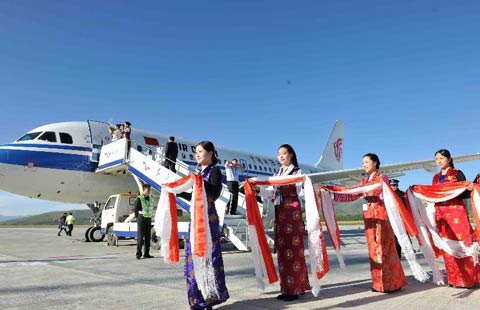Getting the message across
By Meng Fanbin (China Daily) Updated: 2012-04-23 10:17
 A worker preparing an outdoor advertising board in Nanjing, Jiangsu province. China's advertising market is growing rapidly, but the main players remain foreign firms. [Photo/China Daily]
|
Multinational agencies are winning the battle for the biggest advertisers
Tony Fan, 35, the owner of a Beijing-based advertising agency, had been talking the whole day with his business partners about the company's latest failed bid, which was won by a multinational advertising company.
"Instead of feeling depressed, I'm honored to have the chance to compete with large international companies," he said.
His company, IBrand Solution (Beijing) Ltd, founded in 2006, is a small one with fewer than 10 employees and an annual profit of only several million yuan. Its clients range from international non-governmental organizations to regional consumer goods companies.
Some multinational advertising corporations are in de facto control of China's advertising market due to their advanced management, rich experience, adequate funding and high-end professionals.
Since the opening-up of the Chinese market at the end of 1970s, the rapid development and potential of the nation's advertising market attracted the attention of members of the American Association of Advertising Agencies, known as 4A enterprises, which were eager to enter China in the 1990s.
Statistics show domestic advertising agencies generated revenue of 94.04 billion yuan ($14.94 billion) in 2010, which accounts for only 40.18 percent of China's total advertising turnover, up 10.7 percent year-on-year, lower than the average growth of the industry.
At the same time, there were only three domestic advertising companies among the top 10 advertising agencies by annual revenue in 2010 - Charm Communications Inc, Guangdong Advertising Co Ltd and AVIC Culture Co Ltd.
Data from the China Advertising Association shows that the top 10 advertising agencies realized revenue of 36.4 billion yuan in 2010, accounting for 39 percent of advertising agencies' total turnover, rising 4 percentage points from the year before. More clients and high quality resources have been attracted to large advertising companies, especially multinationals.
"Multinational advertising agencies have more adequate finance, more advanced technology and management and more talents, posing a threat to domestic agencies," said Professor Huang Shengmin, dean of the Advertising School at Communication University of China.
With a globally unified working system and specific analytical tools, Ogilvy & Mather Advertising, one of the largest marketing communication companies in the world, possesses not only a global service network but has also accumulated large amounts of professional knowledge, Shenan Chuang, CEO of Ogilvy & Mather in China, told China Daily in an exclusive interview.
"Compared with young Chinese advertising agencies, foreign advertising conglomerates understand the market economy and marketing management more deeply and comprehensively," said Dang He, chairman and chief executive of Charm Communications Inc.
The State Council released the plan on culture industry revitalization on Sept 26, 2009, the first time that China announced clearly and definitely that it would boost the development of the culture industry, such as advertising, comics and animation. As a result, advertising became a strategically important industry that the nation was going to foster.
The following year, four Chinese advertising companies were listed.
|
 |
This "was a sign that late-starting Chinese advertising companies were beginning to compete in the capital market and continue to strengthen in the coming years", said Qiao Jun, a professor at the School of Journalism and Communication at Nanjing University.
Statistics show that the number of advertising agencies in China reached 243,000 in 2010, with total revenue of 234.05 billion yuan in the year and 1.48 million employees.
China is already the world's second-largest advertising market, Chairman of International Advertising Association Alan Rutherford said at the International Advertising Festival held in Changsha in May 2011.
Top enterprises
Multinational advertising companies already had rich experience before they entered China. On the other hand, advertising was new to most Chinese, who had not experienced or realized its value, said Professor Huang.
At the beginning of reform and opening-up, Chinese people preferred foreign products and ideas, and most advertisements for foreign brands were successful, he added.
- Smart interface 'on board'
- Moutai shows stable performance in H1
- Microsoft to close MSN service in China by Oct 31
- Tesla, China Unicom to build charging outlets across China
- First Chinese car factory opened in Brazil
- Direct flight links Harbin with Moscow
- Alibaba to test home textile 'try-before-you-pay' sales
- China's Papaya goes from games to ads

















